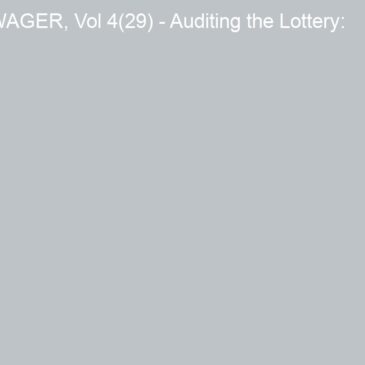Tax evasion is a crime common to many strata of society. But are all forms of tax evasion the same qualitatively? Is there a difference between the kind of tax evasion committed by gamblers and the kind common to the general public? Recent events at the Massachusetts Lottery provides an apt case for studying this question. Last week the Commonwealth of Massachusetts auditor’s office released an audit of the state’s Lottery Commission. The report outlined numerous findings and made recommendations, most of which deal with the Lottery’s internal operations. Nestled among the commentary on payroll practices, revenue collection, and printing subcontracts is a section that is significant for the study of gamblers, both healthy and pathological.
When a lottery prize exceeds $600 in value, the winning ticket must be brought in person to one of six Commonwealth lottery offices for verification and redemption. After presenting the ticket to a lottery officer, winners are required to provide positive identification, proof of address, Social Security numbers, and other personal data. The lottery uses this data to complete IRS form W2-G, which reports gambling winnings for tax purposes. Without an accurate W2-G, winnings may go unreported and thus untaxed. Similarly, unreported or misreported winnings bypass the government apparatus through which welfare fraud, nonpayment of child support, and identity theft are controlled. The incentives to deceive the system are substantial and the revenue at stake is significant. Thus, when the Auditor’s report cited multiple cases of fraud and abuse, it made the front page of both major Boston newspapers. Among the audit’s findings:
* Winnings of $2.2 million were claimed using invalid Social
Security numbers, including those of deceased persons. In some
cases a claimant reported the same street address in multiple
municipalities. As a result, nearly 1,800 W2-G forms were returned
to the Lottery as undeliverable by the Postal Service. The audit
believes this to be evidence that these winnings were "unreported
and resulted in tax and other forms of evasion." The audit found at
least 75 "identification deficiencies" among 182 lottery claimants
who had won multiple prizes.
* Auditors were unable to find telephone numbers for over half the
182 claimants included in their sample. Of these, nineteen could
not be matched to a date of birth or address.
* In numerous cases, a single person would present an improbably
high number of winning tickets during a given year. In 1998 alone,
one individual presented 319 winning tickets worth over $412,000.
None of this money, the auditors found, had undergone tax
withholding. In addition, no address, phone number, or date of birth
could be traced for this individual.
The audit believes that the combination of these facts suggest the existence of "professional cashiers," who act as intermediaries between the actual winners and the Lottery Commission. For a fee of less than the winner’s potential tax liability, these go-betweens claim the prize on behalf of the actual winner while avoiding taxation through the use of inaccurate identification information. A sample of high-frequency winners was found to include two persons for whom no Social Security records could be found, Social Security numbers shared by two or more individuals, and one claimant who reported the same street address in multiple municipalities.
The audit makes several suggestions and encourages the Lottery Commission to tighten its security controls. Yet several other important issues are also raised. The first is methodological. Lottery data can be an important source of information for the field of gambling studies. But if the audit is correct in its suspicion of professional cashiers, then the reliability of such data must be questioned. In addition, is there a quantitative or qualitative difference between the tax evasion of lottery winners and that of the general public? Are individuals more likely to misreport lottery winnings than income earned through labor or other conventional means? Since evasion of taxes is a crime common to the gambling and non-gambling public alike, looking at behavioral differences between the two groups might yield interesting insight in to the nature of the relationship between gambling and criminal behavior.
Source: Auditor of the Commonwealth of Masasachusetts. (1999). Independent state auditor’s interim transition report of certain activities of the Massachusetts State Lottery Commission. (No. 99-0089-3). Boston: Author.
The WAGER is funded, in part, by the Massachusetts Council on Compulsive Gambling, the Andrews Foundation, and the National Center for Responsible Gaming.




